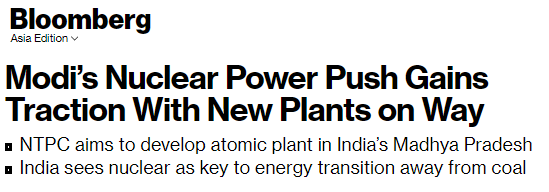India recognises role of Nuclear in energy transition
The latest country to announce nuclear as a critical future source for baseload energy generation in India.
The following Bloomberg article highlights recent developments in India, which is aiming to shift its coal heavy energy mix to cleaner sources of power generation.

Read the full article here.
Our key takeaways:
- India’s largest power producer is looking to develop more nuclear power plants.
- India is currently building six gigawatts of nuclear capacity, the most after China, which has nearly three times that volume under construction.
- The Indian government aims to triple India’s nuclear fleet over the next decade as it looks to decarbonise its energy grid.
- The move is part of India’s pathway to a zero carbon economy by 2070.
- Mumbai based Deloitte partner Debasish Mishra also thinks that “From a carbon footprint point of view, nuclear is the best form of baseload power and that makes it a crucial part of India’s journey to net zero.”
We have long held the view that nuclear is a key part of the future global energy mix, especially regarding baseload energy generation.
Nuclear power has one of the lowest carbon footprints and highest utility rates of all renewable energy technologies currently available.
We think this, combined with its ability to operate on an almost 24/7 basis, makes it the ideal technology to sit alongside more intermittent renewable energy technologies like wind and solar.
We believe that more countries will follow the likes of India and China and eventually invest heavily into nuclear power to meet climate change goals and secure energy supplies domestically.
With uranium being the primary fuel source for nuclear power, we think our uranium exploration investment GTI Energy (ASX: GTR) is well positioned to benefit from capital inflows into the uranium industry.
To see the key reasons why we are Invested in GTR and the key objectives we want to see the company achieve in 2022, check out our 2022 GTR Investment Memo by clicking here.






